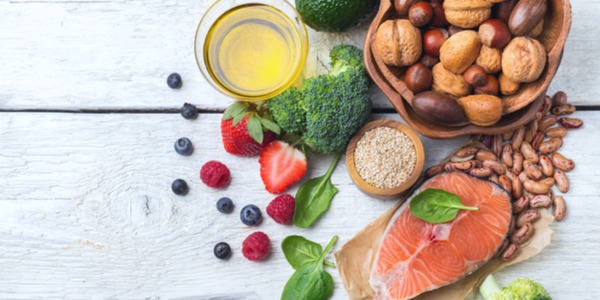
While aspects like genetics can’t necessarily be controlled regarding heart health, lifestyle factors—like diet—can be altered. Eating more foods for heart health is a great preventative measure to take. Plus, foods for a healthy heart can be tantalizingly tasty!
Keep reading for the top heart-healthy diet foods, including various items from across the food groups.
What Are Heart-Healthy Diet Foods?
As the name suggests, a heart-healthy diet contains healthy foods that help to reduce the risk of heart disease. These foods are associated with certain health benefits, such as being high in fiber or low in saturated fat.
Like any other healthy diet, a heart-healthy diet doesn't mean restriction. Often, it means eating more of the healthy foods you already enjoy! There’s room for healthy snacks and desserts, with old and new studies suggesting that following a heart-healthy diet "most of the time"—or about 80-90% of the time—offers health benefits.
Many types of diets can fall under the heart-healthy "umbrella." Plant-forward diets contain many heart-healthy foods—like the Mediterranean diet and most vegetarian diets. In particular, a DASH diet can benefit heart health through nutritious plant foods and a significant salt reduction.
50+ Foods for a Healthy Heart
A heart-healthy diet begins with heart-healthy foods. The following foods contain vitamins and minerals to keep the heart beating and blood vessels healthy. Try incorporating these items into an upcoming meal.
Leafy Greens
Leafy greens are just one of the many vegetables associated with reducing the risk of heart disease. Like fruits, vegetables are natural sources of potassium, a mineral crucial to managing blood pressure. In particular, leafy greens provide powerful antioxidants in addition to potassium, folate, and fiber.
In general, the darker the leafy green, the better! Adding them to foods you already eat—such as casseroles, sandwiches, or rice dishes—can make transitioning to eating more greens easier. The following leafy greens are popular among heart-healthy shoppers:
• Arugula
• Bok choy
• Collard greens
• Escarole
• Lettuce (like Boston, Bibb, or Romaine)
• Mustard greens
• Spinach
• Swiss chard
• Kale
• Watercress
Cruciferous Vegetables
A unique vegetable category called cruciferous is associated with reducing chronic disease risk, including heart disease. Like leafy greens, a darker color in cruciferous vegetables generally indicates a higher concentration of nutrients.
In addition to being affordable and easy to find in most stores, cruciferous veggies offer a plethora of nutrients. Typically, cruciferous vegetables are higher in vitamins C, E, and folate and high in minerals like calcium and potassium—both of which are crucial to heart health. Plus, cruciferous vegetables are high in fiber, which has heart health benefits, too.
Try integrating the following cruciferous picks into your diet today:
• Asparagus
• Broccoli
• Brussels sprouts
• Cabbage
• Cauliflower
• Radish
• Rutabaga
• Turnip
Olives & Olive Oil
Olives and olive oil are mainly monounsaturated fats, a "healthy" type of fat. While eating more fat to stay healthy may sound counterintuitive, the body needs healthy fats to thrive. Interestingly, recent research has shown that a higher intake of olive oil may reduce the risk of cardiovascular disease and both total and cause-specific mortality.
In other words, eating olives and olive oil is associated with living a longer, healthier life! Areas called "blue zones"—where populations tend to live longer—have a higher intake of olive products. The Mediterranean is one such area, and olives are thought to be a key part of the Mediterranean diet’s success.
Non-Tropical Vegetable Oils
Olive oil isn't the only option when it comes to heart-healthy fats. Most plant-based oils, except coconut and palm oils, are considered cardio-friendly.
Look for plant-based oils in their liquid form, which indicates a higher presence of heart-healthy, unsaturated fats. Prioritizing these types of fats over saturated ones helps reduce the amount of LDL—or "bad"—cholesterol in the body.
Unsure where to start regarding veggie and plant-based oils? Try the following heart-healthy cooking oils with your next meal to make it more satiating:
• Avocado oil
• Flaxseed oil
• Safflower oil
• Sesame oil
• Walnut oil
Berries
Berries rank at the top of most heart-healthy food lists and for a good reason. They contain powerful compounds called phytochemicals and flavonoids, which help contribute to antioxidant activity. Essentially, these compounds help to relieve stress put on the body by inflammation, illness, or injury.
Additionally, most berries contain pectin, which is a type of fiber. Thanks to pectin, berries may be able to help lower LDL cholesterol and balance blood sugars. Most berries can be enjoyed on their own or mixed into another meal.
Blueberries are especially popular since they can be eaten easily in fresh and frozen forms. Other common favorites include:
•Blackberries
•Raspberries
•Strawberries
Citrus
Similar to berries, citrus fruits contain a compound called flavonoids. As their name suggests, flavonoids influence the flavor. Along with impacting taste, they act as antioxidants, a crucial component of heart-healthy foods.
If you're interested in increasing your citrus intake, try adding the following foods to your diet during the week:
• Lemons
• Limes
• Oranges
• Grapefruit
Melons
Melons are the ultimate "bang for your buck" fruit, considering they are typically one of the least expensive fruits you can buy. Plus, they contain potassium to help improve heart health by lowering blood pressure and reducing the impact of sodium on blood vessels.
Many melons are also water-rich, meaning they can help contribute to your hydration goals! The most commonly consumed melons include:
• Cantaloupe
• Honeydew
• Watermelon
Stone Fruits
Peaches, plums, and prunes, oh my! Stone fruits are a special type of heart-healthy food that also benefits digestion, thanks to their mild laxative effect. As their name implies, stone fruits have a "stone" or pit in the middle.
Beyond being nutrient-dense, stone fruits are rich in phytochemicals. As mentioned above, phytochemicals (sometimes called phytonutrients) are unique components of food that help reduce "bad" cholesterol and prevent cardiovascular disease.
Most stone fruits are also naturally high in potassium, with apricots being a top source. Searching for other stone fruits? Try cherries or nectarines.
Nuts & Seeds
If you're looking for foods full of heart-healthy fats, it's hard to beat nuts and seeds. Research has shown that eating just a ¼ cup daily can help lower cholesterol levels. Many of the following nuts, seeds, and related products contain omega-3 fatty acids, which can reduce the risk of having heart problems:
• Almonds
• Chia seeds
• Flaxseeds
• Hazelnuts
• Nut and seed butters
• Peanuts
• Pecans
• Pine nuts
• Pumpkin seeds
• Sesame seeds
• Sunflower seeds
• Walnuts
In addition to omega-3s, nuts and seeds contain other heart-protective nutrients. For example, they contain plant sterols and stanols that can help reduce cholesterol.
Nuts and seeds also contain antioxidants, fiber, phytoestrogens, and plant protein. These beneficial vitamins and minerals can help protect blood vessels from damage while keeping them open for proper blood flow.
Nut and seed consumption is especially effective when these delicious foods replace sources of saturated fats. Seek unsalted varieties to keep your intake heart-healthy.
Legumes & Lentils
Nearly any food that falls into the legumes and pulses family can benefit heart health, beans included. Peas and lentils also fall into this family and contribute high amounts of fiber to the diet. Fiber contributes to a feeling of fullness, which can help curb cravings.
Legumes and pulses also provide vitamins and minerals, B vitamins in particular. Lentils are a special source of potassium, with over 700 mg per 1 cup serving. This meets 16% of your daily potassium requirement! Kidney beans and soybeans provide higher amounts of potassium as well.
Beans are one of the most approachable legumes, and can easily be used to bulk up dishes like chili. Consider using the following types of beans for your next meal:
• Black
• Garbanzo (chickpeas)
• Lima
• Black
• Pinto
Whole Grains
Next on the list are whole grains, which are heart-healthy for many reasons. Since refined grains are stripped of nutrients, switching to whole grains whenever possible is the obvious choice for heart health. Whole grains are nutrient powerhouses, containing fiber, protein, and B vitamins in every bite.
Oats are one of the most popular types of whole grains. They are extremely versatile and can be eaten hot, cold, cooked, or uncooked. Eating more oats may also help to lower cholesterol, due to their dietary fiber.
Feeling adventurous? Try out a new whole grain soon, such as:
• Barley
• Brown rice
• Quinoa
• Whole grain bread or tortillas
Fatty Fish
You've probably heard that fat is bad for heart health, so the recommendation to eat fatty fish may initially sound contradictory. But eating at least one or two meals with fatty fish each week is recommended, and you'll get healthy doses of omega-3 fatty acids and protein.
If unsure what qualifies as fatty fish, the following seafood varieties are included in this category:
• Anchovies
• Bass
• Cod
• Herring
• Mackerel
• Salmon
• Sardines
• Trout
• Tuna
• Whitefish
Lean Meats
Speaking of lean proteins like fish, poultry, and other lean meats also benefit heart and overall health. Chicken, turkey, and ground meats like beef or pork can be a healthy choice when eaten in place of red meat.
Search for skinless cuts or those that look visually thinner. These will not only cook more quickly, but they will naturally be smaller portion sizes. For example, ground beef which is 95% lean is a versatile protein to keep on hand.
Low-Fat Dairy Products
Another animal product chock-full of nutrients is milk. Related dairy products, such as yogurt and cheese, contain protein and calcium, too. Calcium is known for its bone-strengthening benefits but is also important for healthy blood vessels.
For heart health, tend towards low-fat or fat-free dairy instead of full-fat options. Protein-rich Greek yogurt is also a good choice, and it can replace sour cream in many recipes.
Soy Products
Last on the list, but no less important, are soy foods. Commonly high in nutrients—like vitamins, minerals, fiber, protein, and healthy fats—soy foods are thought to lower the risk of cardiovascular conditions according to recent research, although more evidence is needed.
If tofu isn't your thing, that’s okay! Try other available soy foods like:
• Calcium-fortified soy milk
• Edamame
• Soybeans
• Tempeh
4 Heart-Healthy Diet Tips
In addition to eating the healthy foods listed above, heart-conscious cooking methods can make a big difference. Use these tips when shopping and preparing meals to help protect your heart.
Pick Whole Foods Over Processed Products
As a general tip, choose foods in their most whole form. Plant-based foods typically contain a higher amount of nutrients than ultra-processed ones. In particular, processed meats—like bacon and hot dogs—have been strongly associated with increasing the risk of heart disease. On the other hand, raw and whole foods like fruits and vegetables are continuously shown to cause cardiovascular benefits.
This is even true when you have a sweet tooth. Dark chocolate is a great example— generally, the higher the percentage of cocoa (70% or higher), the better for heart health! Higher amounts of cocoa mean less room for additives like sugar and saturated fats.
Beware of Beverages
When carefully choosing cardio-protective foods, don't overlook beverages. Alcoholic drinks and those with added sugars can especially harm those with heart problems.
Although red wine may improve HDL (or "good") cholesterol levels, health experts often recommend consuming no more than one glass daily. It’s also not recommended to start drinking red wine as a preventative measure, especially if you don’t drink.
In general, limit alcohol intake or abstain from drinking alcohol altogether, as it’s been shown to raise the risk of cardiovascular conditions.
Check the labels of the following beverages before consuming them to ensure they fit within a heart-healthy lifestyle:
• Caffeinated drinks like coffee and tea
• Energy drinks
• Flavored or sparkling waters
• Fruit drinks and juices (look for 100% juice as the healthiest option)
• Sodas and other sugar-sweetened beverages
Moreover, it’s estimated that sweetened drinks account for nearly half of the added sugars consumed. This means the adage "don’t drink your calories" holds much truth, especially for heart health.
Use Fresh Herbs and Seasonings
Although salt can add a special sort of savor to dishes, it causes an almost immediate increase in blood pressure and can cause high blood pressure over time. As the DASH diet recommends, reduce salt (sodium) to 2,300 mg daily for heart health. For certain individuals, additional benefits for blood pressure may be seen by reducing as low as 1,500 mg per day.
Since packaged foods are the top sources of salt in the United States, making more home-cooked meals can help you control the amount of salt in your food. Luckily, there are other spices and seasonings to choose from.
Explore herbs and spices you've never tried before, and consider making your own seasoning blends for fun—and for your heart!
Swap Solid Fats for Heart-Healthy Oils
As mentioned above, saturated fats are especially harmful to the heart and its supporting blood vessels. It may sound strange, but there’s an easy way to tell if fat is heart-healthy. Solid fats at room temperature are typically worse for health than liquid oils and lipids.
The following heart-healthy oils can be used for cooking instead of animal fats like lard, butter, or bacon grease to help control cholesterol. They can also be used in place of less healthy solid vegetable-based fats like shortening or margarine:
• Canola oil
• Safflower oil
• Sesame oil
• Sunflower oil
Foods for Heart Health: Final Thoughts
Adding various nutrient-rich foods and beverages can help protect the heart. Eating to reduce the risk of cardiovascular disease is anything but boring since foods from every food group are shown to have health benefits.
Herbs, seasonings, and cardio-protective cooking oils can also add spice and flair to your favorite heart-healthy foods!
References
Academy of Nutrition and Dietetics. Different Kinds of Lettuces and Greens. Eatright.org. Published January 2021.
American Heart Association. Fish and Omega-3 Fatty Acids. Heart.org. Published November 2021.
American Heart Association. The American Heart Association Diet and Lifestyle Recommendations. Heart.org. Published November 2021.
Bachheti RK, Worku LA, Gonfa YH, Zebeaman M, Deepti, et al. Prevention and Treatment of Cardiovascular Diseases with Plant Phytochemicals: A Review. Evid Based Complement Alternat Med. 2022;2022:5741198.
Buettner D. Blue Zones Diet: Food Secrets of the World’s Longest-Lived People. Bluezones.com. Published July 2020.
Bunning, M., Shackleton, E. (2022). Dark Leafy Greens. In: Miller, J.P., Van Buiten, C. (eds) Superfoods. Food and Health. Springer, Cham.
Christie C. Maintaining a Heart-Healthy Diet Most of the Time. J Cardiovasc Nurs. 2010;25(3):233-237.
Cleveland Clinic. What Are Cruciferous Vegetables — and Why Are They So Good for You? Health.clevelandclinic.org. Published June 2023.
Cleveland Clinic. 12 Heart-Healthy Foods to Work Into Your Diet. Healthy.clevelandclinic.org. Published July 2019.
Dinu M, Pagliai G, Sofi F. A Heart-Healthy Diet: Recent Insights and Practical Recommendations. Current Cardiology Reports. 2017;19(95).
Ellis E. Prepare Heart Healthy Foods for Your Family. Eatright.org. Published February 2022.
Ellis E. 25 Heart-Healthy Eating Tips. Eatright.org. Published February 2022.
Good Food Is Good Medicine. I’m a cardiovascular dietitian. Here are 7 things I eat and avoid for heart health. Health.ucdavis.edu. Published February 2023.
Harvard Health Publishing. 11 foods that lower cholesterol. Health.harvard.edu. Published August 2021.
Klemm S. DASH Eating Plan: Reducing Blood Pressure through Diet and Lifestyle. Eatright.org. Published February 2021.
Klemm S. What are Omega-3 Fatty Acids. Eatright.org. Published March 2022.
Kumar S, Pandey AK. Chemistry and Biological Activities of Flavonoids: An Overview. Sci World J. 2013;2013:162750.
Mahmoud AM, Bautista RJH, Sandhu MA, Hussein OE. Beneficial Effects of Citrus Flavonoids on Cardiovascular and Metabolic Health. Oxid Med Cell Longev. 2019;2019:5484138.
Muñoz-Almagro N, Ruiz-Torralba A, Méndez-Albiñana P, Guerra-Hernández E, GarcÍa-Villanova B, et al. Berry fruits as source of pectin: Conventional and non-conventional extraction techniques. Int J Biol Macromol. 2021;186:962-974.
National Heart, Lung, and Blood Institute. Choose Heart-Healthy Foods. Nhlbi.nih.org. Published March 2022.
National Institutes of Health. Potassium. Ods.od.nih.gov. Published June 2022.
Pollock RL. The effect of green leafy and cruciferous vegetable intake on the incidence of cardiovascular disease: A meta-analysis. JRSM Cardiovasc Dis. 2016;5.
Ulaszewska M, Vázquez-Manjarrez N, Garcia-Aloy M, Llorach R, Fulvio M, et al. Food intake biomarkers for apple, pear, and stone fruit. Genes Nutr. 2018;13(29).







